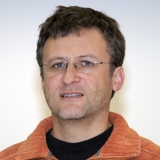
Center for Cancer Research, Department of Medicine I
Position: Associate Professor
T +43 1 40160 57556
michael.grusch@meduniwien.ac.at
Keywords
Drug Resistance; Fibroblast Growth Factors
Research interests
Our research is focused on growth factors and their receptors involved in cancer cell growth and drug resistance. We aim to (1.) understand how growth factor signals contribute to malignancy (2.) translate this knowledge into strategies for therapeutic interventions and (3.) characterize the mechanisms that determine sensitivity or resistance of tumors to molecularly targeted therapeutics.
Within this area we are interested on the one hand in receptor tyrosine kinases (RTKs) of the fibroblast growth factor receptor (FGFR) and epidermal growth factor recetor (EGFR, erbb) families which are (over)activated in many human cancer types and on the other hand in activins - members of the transforming growth factor (TGF) beta family that act as regulators of cell death and differentiation in a tissue-specific manner.
Techniques, methods & infrastructure
A broad spectrum of biochemical, cell biological, and imaging techniques are used including optically controlled receptor tyrosine kinases (Opto-RTKs) co-developed in our group.
Selected publications
- Vlacic, G. et al., 2019. Expression of FGFR1–4 in Malignant Pleural Mesothelioma Tissue and Corresponding Cell Lines and its Relationship to Patient Survival and FGFR Inhibitor Sensitivity. Cells, 8(9), p.1091. Available at: http://dx.doi.org/10.3390/cells8091091.
- Schelch, K. et al., 2018. FGF2 and EGF induce epithelial–mesenchymal transition in malignant pleural mesothelioma cells via a MAPKinase/MMP1 signal. Carcinogenesis, 39(4), pp.534–545. Available at: http://dx.doi.org/10.1093/carcin/bgy018.
- Schelch, K. et al., 2014. Fibroblast Growth Factor Receptor Inhibition Is Active against Mesothelioma and Synergizes with Radio- and Chemotherapy. American Journal of Respiratory and Critical Care Medicine, 190(7), pp.763–772. Available at: http://dx.doi.org/10.1164/rccm.201404-0658OC.
- Grusch, M. et al., 2014. Spatio‐temporally precise activation of engineered receptor tyrosine kinases by light. The EMBO Journal, 33(15), pp.1713–1726. Available at: http://dx.doi.org/10.15252/embj.201387695.
- Hoda, M.A. et al., 2012. Suppression of activin A signals inhibits growth of malignant pleural mesothelioma cells. British Journal of Cancer, 107(12), pp.1978–1986. Available at: http://dx.doi.org/10.1038/bjc.2012.519.